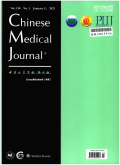Age-related decrease in expression of peroxisome proliferator-activated receptor α and its effects on development of dyslipidemia
摘要Background Ageing is associated with increased incidence of dyslipidemia. To investigate potential molecular mechanisms, the effects of age and fibrate administration on peroxisome proliferator-activated receptor α(PPARα) expression in livers of young and old rats were studied.Methods A total of 16 young (2-month-old) and 16 old rats (24-month-old) were randomly assigned to a control group and fenofibrate group (fenofibrate in a total therapeutic dosage of 0.5% in ratio to each treated rat weight in 14 days). RT-PCR was applied to evaluate hepatic mRNA expression of PPARα and its target genes. Western blotting was used to determine PPARα protein level in liver tissue. Results When compared with 2-month-old rats, the liver tissue from 24-month-old rats showed reduced expression of PPARα mRNA (52%, P<0.05) and protein (109%, P<0.01). Consequently, the mRNA levels of PPAR target genes, LPL, ACO, ACS and CPT-1 were markedly lowered by 19%, 8%, 13% and 9% respectively, and apoCIII increased by 24% in livers from 24-month-old rats, compared with values obtained from 2-month-old rats (P<0.05). Fenofibrate therapy significantly lowered plasma triglyceride and total cholesterol levels in old rats, accompanied with improvement in hepatic expression of genes, including LPL, ACO, ACS, CPT-1 and apoCIII, but no change was found in PPARα expression in livers from either 24-month or 2-month-old rats. Conclusions The decrease in the hepatic PPARα expression is probably directly related to the lipid metabolic disturbances observed in old animals. The beneficial effects of fenofibrate administration in old rats suggests that fibrates may be useful for treating lipid disturbances in old people.
更多相关知识
- 浏览93
- 被引18
- 下载4


相似文献
- 中文期刊
- 外文期刊
- 学位论文
- 会议论文



 换一批
换一批 换一批
换一批



